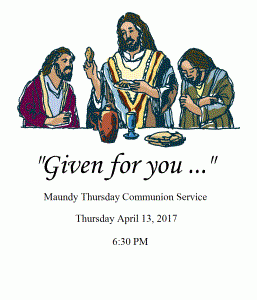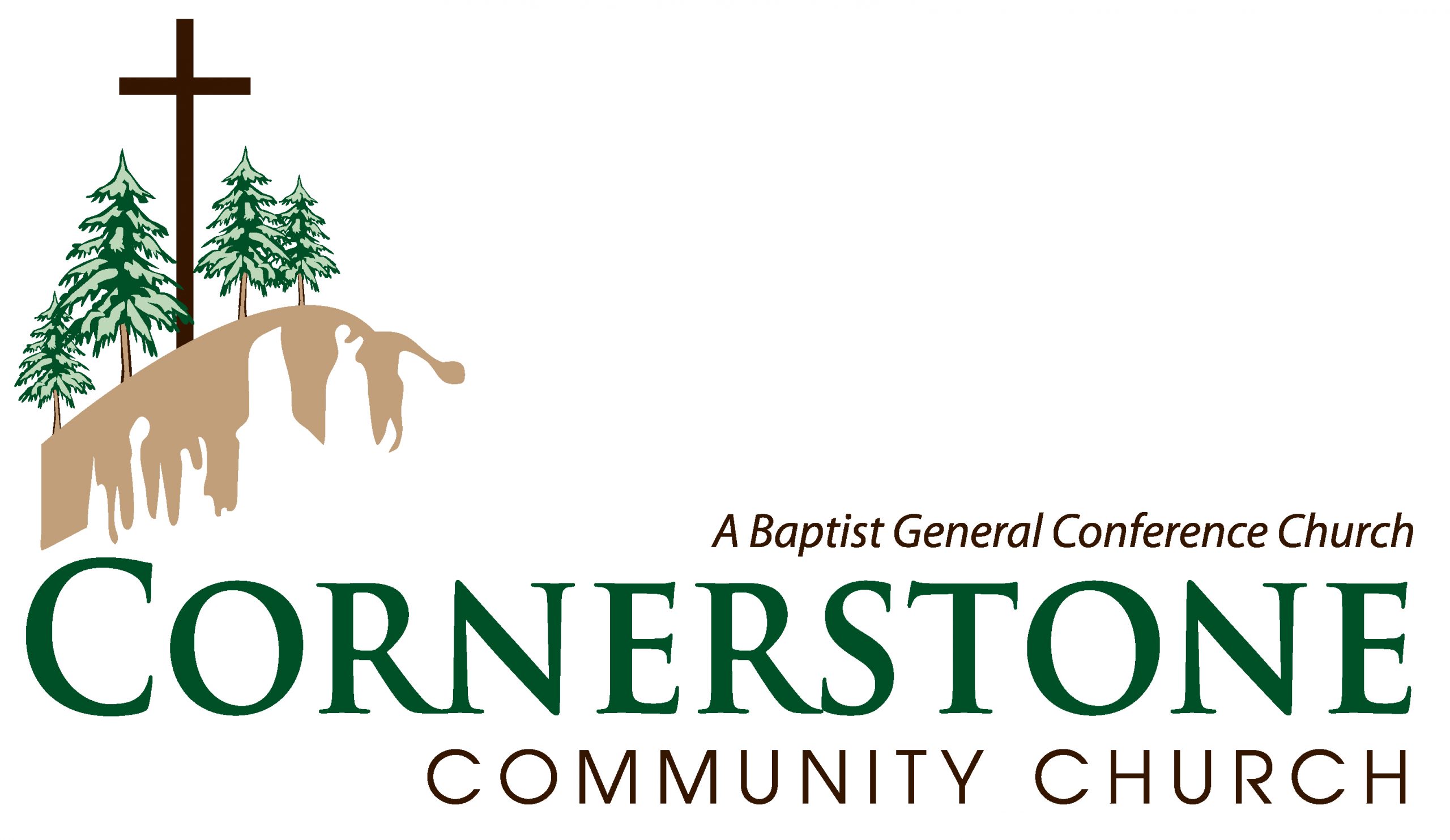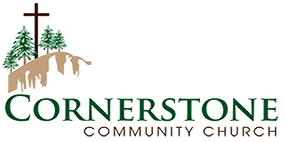Maundy Thursday Reflection
 Maundy Thursday marks the day before Christ is crucified. It is the night Jesus institutes the “Lord’s Supper” and sets an example for His disciples when he washes their feet. The name, “Maundy Thursday,” comes from a corrupted form of a Latin word from which we get our English word “mandate.” You could say this is “Do this in remembrance of me” Thursday.
Maundy Thursday marks the day before Christ is crucified. It is the night Jesus institutes the “Lord’s Supper” and sets an example for His disciples when he washes their feet. The name, “Maundy Thursday,” comes from a corrupted form of a Latin word from which we get our English word “mandate.” You could say this is “Do this in remembrance of me” Thursday.
This year Cornerstone observed Maundy Thursday with a simple communion service. We sang a verse of “Break Thou, the Bread of Life,” had prayer together, considered the following thoughts, then ate the meal ordained by Jesus together. We were few but the Spirit of Christ was present and the tie was precious.
Here are the notes for our meditation:
Maundy Thursday: The Mandate to Covenant Love
1 Corinthians 11:23-26
1. On the night when he was betrayed, at the Passover meal he shared with his disciples in the upper room in Jerusalem, Jesus took a simple cup of wine and a simple piece of unleavened bread, the stuff and staff of earth, and gave them heavenly purpose.
2. 1 Corinthians 11:23-26 (ESV) 23 For I received from the Lord what I also delivered to you, that the Lord Jesus on the night when he was betrayed took bread, 24 and when he had given thanks, he broke it, and said, “This is my body which is for you. Do this in remembrance of me.” 25 In the same way also he took the cup, after supper, saying, “This cup is the new covenant in my blood. Do this, as often as you drink it, in remembrance of me.” 26 For as often as you eat this bread and drink the cup, you proclaim the Lord’s death until he comes.
3. On this evening of remembering God’s mercy and power in delivering His people, Israel, from slavery in Egypt, Jesus refocused their remembering, making it personal and present. “Do this,” he said, and “remember me.” Jesus gave the cup and the bread a new point and a new purpose.
4. The bread, Jesus said, was his body, given and broken for them. The next day they would witness the mocking, the scourging, the crown of thorns, the nails, and the cross. The next day they would see with their own eyes the depth of God’s love for them in sending His Son not merely to live among them and heal them and feed them. The next day they would see with their own eyes God the Father love them with the body of His Son. They would see the Son love them with His flesh under the whip, under the thorns, on the cross. They would see Him love them with His death.
The bread is not an end in itself, an agent of salvation, but a picture, a concrete memory, of how much God loves them. Had Jesus merely said these words, naming the bread his body, but had not done the deed of death on the cross, both His life and that bread would be meaningless for us. All have sinned and fall short of the glory of God. The wages of sin is death, but the gift of God is eternal life through Jesus Christ our Lord. A mere piece of flour and water and salt baked in a hot oven cannot pay the price of sin. Only a body can do that, and only the body of the Son of God can be given for the sins of the whole world.
5. But, a body broken is still not enough. Without the shedding of blood there is no remission of sin. Without the sacrifice of life death will not release its hold.
6. So, Jesus took the cup and gave thanks and passed it to his disciples saying, “This cup is the new covenant in my blood.” What is this new covenant? Jeremiah tells us.
Jeremiah 31:31-34 “Behold, the days are coming, declares the LORD, when I will make a new covenant with the house of Israel and the house of Judah, not like the covenant that I made with their fathers on the day when I took them by the hand to bring them out of the land of Egypt, my covenant that they broke, though I was their husband, declares the LORD.
For this is the covenant that I will make with the house of Israel after those days, declares the LORD: I will put my law within them, and I will write it on their hearts. And I will be their God, and they shall be my people.
And no longer shall each one teach his neighbor and each his brother, saying, ‘Know the LORD,’ for they shall all know me, from the least of them to the greatest, declares the LORD. For I will forgive their iniquity, and I will remember their sin no more.”
The fluid in that cup was not blood but wine. But Jesus never meant for the cup to remind us of grapes. It is to remind us of Him and the covenant God would make with us through His sacrifice. The Bible tells us that the life is in the blood. To shed one’s blood is to give one’s life. To give up one’s life for one’s sin is just, but to give up one’s sinless life for the lives of others is love. The new covenant is a covenant of love established by an act of love.
7. “Do this,” Jesus said, “as often as you eat this bread and drink this cup, in remembrance of me.” Do this – don’t leave it undone. Don’t omit or neglect this: this meal, this observance, this act of worship. And when we “do this,” we do at least four other things:
i. Acknowledge God’s salvation plan. All have sinned. All need a Savior. God has saved through the life and death and resurrection of His Son.
ii. Be assured of the efficacy of God’s actions in Chris. This question from the Heidelberg Catechism: How does the Lord’s Supper remind you and assure you that you share in Christ’s one sacrifice on the cross and in all his gifts? The answer: “In this way: Christ has commanded me and all believers to eat this broken bread and to drink this cup. With this command he gave this promise: First, as surely as I see with my eyes the bread of the Lord broken for me and the cup given to me, so surely his body was offered and broken for me and his blood poured out for me on the cross. Second, as surely as I receive from the hand of the one who serves, and taste with my mouth the bread and cup of the Lord, given me as sure signs of Christ’s body and blood, so surely he nourishes and refreshes my soul for eternal life with his crucified body and poured-out blood.
iii. Affirm your faith. (These thoughts from Kevin DeYoung) “The Lord knows our faith is weak. That’s why he’s given us ordinances to see, taste, and touch. As surely as you can see the bread and cup, so surely does God love you through Christ. As surely as you chew the food and drink the drink, so surely has Christ died for you. Here at the Table the faith becomes sight.”
The simple bread and cup give assurance that Christ came for you, Christ died for you, Christ is coming again for you. The effect of Jesus’ humility, faith, obedience, and sacrifice applies directly to your life in all its temporal aspects. In regards to the past – forgiveness. In regards to the present, fellowship. In regards to the future, felicity.
iv. Announce the gospel. The gospel is about Jesus and the focal point of the gospel is His death on the cross. Thus, when we “do this” in remembrance of Him we proclaim His death until he comes: the fact of His death and the benefits of His death.
8. So, consider this invitation to the table from a United Methodist author:
Come to this sacred table, not because
you must, but because you may;
Come, not to testify to your righteousness,
but that you sincerely love our Lord
Jesus Christ and desire to be His
true disciple;
Come not because your goodness gives you
a right to come, but because in your
frailty and sin you stand in need of
heaven’s mercy and help;
Come because you love the Lord a little
and you want to love Him more;
Come because He loved you and gave
Himself for you;
Lift up your hearts, above your cares
and fears;
Let this bread and wine be a sign
of God’s grace to you and a pledge of
your love to the Lord Christ;
Receive the love of God and consecrate
your life afresh to Christian obedience
and service, to discover and to the
will of God in humble faith.
–Adapted (and borrowed)


No Comments